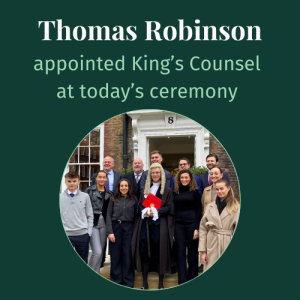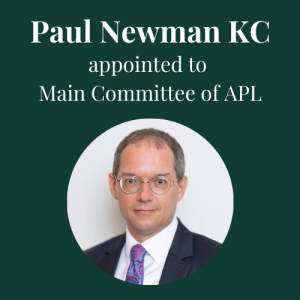
Events / Webinars
Wilberforce Nugee Memorial Pensions Conference & Dinner 2025
Thursday 5 June 2025
Nobu Shoreditch, London
PensionsMonday 7 February 2022
Judgment has been handed down in Punter Southall Governance Services Ltd v Benge [2022] EWHC 193 (Ch).
This decision of Chief Master Shuman concerns the circumstances in which the Court might refuse to bless a decision of pension scheme trustees, with particular reference to the meaning of “necessaries of life”, the conflicted position of member-trustees, and the relevance of disputed matters of fact. It will be important both for those considering the payment of discretionary benefits from pension schemes, including the interrelationship of scheme rules and the authorised payments regime under the Finance Act 2004, as well as more generally in relation to the robust approach the Court should take to beneficiaries seeking to oppose the blessing of trustee decisions.
Following the death of Mr Thomas Benge, Punter Southall Governance Services Ltd, the independent trustee of the BST Group Pension Scheme, decided to exercise its discretion to pay a death benefit to Mrs Barrett, a member and trustee of the scheme, as a dependant of Mr Benge. This was vehemently opposed by Mr Benge’s son, Mr Nigel Benge, and consequently the trustee sought the Court’s blessing under the Public Trustee v Cooper jurisdiction. Giving judgment for the trustee, the Chief Master addressed three points of wider relevance.
First, the trustee’s power to pay the death benefit to Mrs Barrett was contingent upon her qualifying under a provision of the trust deed as a person “who in the opinion of the Trustees is (or was at the date of his death) dependent or interdependent on [Mr Benge] for all or any of the necessaries of life”. In announcing their decision to members, the trustee had referred not to the provision in the trust deed, but to the HMRC definition of dependant in schedule 28 paragraph 15 of the Finance Act 2004: a person is a dependant of a member “if, in the opinion of the scheme administrator, at the date of the member’s death (a) the person was financially dependant on the member, (b) the person’s financial relationship with the member was one of mutual dependence, or (c) the person was dependant on the member because of physical or mental impairment.” It was argued for Mr Nigel Benge that this test was different, and the trustee had been wrong to apply the HMRC test rather than the test in the trust deed.
The Chief Master considered the Court of Appeal’s decision in Simmons v White Brothers [1899] 1 QB 1005, where Romer LJ held (at 1008) that a “dependant” is someone who is dependent on another “for the ordinary necessaries of life, having regard to his class and position in life.” She considered the term “necessaries” to be fact sensitive in relation to “class and position in life” and that being dependant on someone for the necessaries of life, as required by the trust deed, was “materially the same” as the definition of dependant under the FA 2004. As a result, there is helpfully no difference between what is permitted by the trust deed, and the authorised payments regime under the FA 2004.
Second, there was clearly a potential conflict owing to Mrs Barrett’s position as trustee, member, and potential object of the trustee’s discretion in relation to the death benefit. This was managed by the appointment of the claimant as trustee, and the complete exclusion of Mrs Barrett from any decision-making in relation to the death benefit. It was nevertheless complained that this exclusion meant that she had failed “to perform the duty of a trustee to ensure that all information required for the making of a properly informed decision is available” and that the Court should apply the more onerous test set out by Briggs J in Jones v Firkin-Flood [2008] EWHC 2417 that where there is a conflict the trustee must prove that the transaction was “fair and reasonable”. The Chief Master rejected this, considering that Jones v Firkin-Flood was concerned with a conflict which had not been managed – it was only revealed in the course of evidence at trial. Mrs Barrett could not be “’Schrödinger’s’ trustee”, criticised both for acting as trustee and for not so acting.
Third, Mr Nigel Benge repeatedly made serious but unsubstantiated factual allegations against Mrs Barrett, extending to dishonesty and other criminal conduct, and complained that the trustee had not taken this material into account when he latterly produced documents which were alleged to support these allegations. The Chief Master held that if Mr Nigel Benge had wished to pursue such allegations he could have done so in Part 7 proceedings, before the Pensions Ombudsman, or elsewhere. In circumstances where the trustee confirmed that it had considered this new material but remained of its prior view that the death benefit be paid to Mrs Barrett, there was no basis to refuse blessing, the Chief Master re-stating the Public Trustee v Cooper orthodoxy that “[t]he court does not forensically examine from the start of the process but rather looks at the end result, the decision, and asks itself whether there is a sufficiency of evidence to support this. I am satisfied that the claimant, and Dentons before, have taken account of only relevant matters and reached the decision which is squarely within the range of decisions which a reasonable trustee could make on the basis of this evidence.”
Following the handing down of her judgment, the Chief Master ordered both the trustee’s and Mrs Barrett’s costs to be paid by Mr Benge, on the footing that his hostile approach to Mrs Barrett in particular had taken this case out of the ordinary case of a trustee blessing (where all parties’ costs are normally paid from the fund) and had given it the character of hostile litigation (where the loser pays the winner’s costs).
Paul Newman QC was instructed on behalf of the successful trustee. Michael Ashdown was instructed on behalf of Mrs Barrett.
The full judgment can be found here.

People to view:

Events / Webinars
Thursday 5 June 2025
Nobu Shoreditch, London

News
Wilberforce Chambers is delighted to announce that Thomas Robinson has been appointed King’s Counsel at today’s ceremony at Westminster Hall. Thomas Robinson KC, has a strong commercial / chancery practice with particular emphasis on pensions, insolvency and corporate matters, including... Read more
Monday 24 March 2025
View more
News
Paul Newman KC has been invited to become a member of the Main Committee of the Association of Pension Lawyers. Paul looks forward to working with the rest of the Committee and serving the Association.
Thursday 30 January 2025
View more
News
Wilberforce Chambers is delighted to announce that Thomas Robinson is to be appointed King’s Counsel. Tom, called to the bar in 2003, has a stellar commercial chancery practice with particular emphasis on pensions, insolvency and corporate matters including directors’ duties... Read more
Friday 24 January 2025
View more